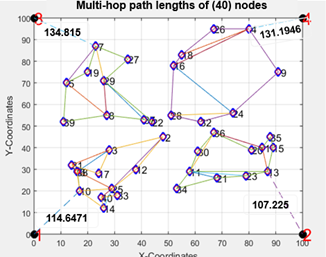MULTI-HOP PATH OPTIMIZATION STRATEGY BY GENETIC ALGORITHM FOR WIRELESS SENSOR NETWORKS
DOI:
https://doi.org/10.71146/kjmr381Keywords:
WSNs, Genetic Algorithm, Efficient routing scheme, path optimization, multiple hops and direct communicationAbstract
Wireless Sensor Networks (WSNs) have been a key research area over the last three decades. WSNs are comprised of low-power sensors with limited battery capacity, and energy depletion is an essential issue that usually results in a short network lifetime for WSNs. To address this problem, this study proposes a multi-hop routing strategy to maximize the network lifetime and compare it with direct communication strategies. Most of the energy used in sensor networks is dedicated to data transfer and acquisition, particularly if non-optimized routing is employed. Thus, there is the usage of a meta-heuristic genetic algorithm to compute the most appropriate route. A variant of this genetic algorithm is used to optimize results further, enabling the choice of the optimal route from all available ones, thus preserving energy in the WSNs. Data is routed to the sink via intermediate neighbor nodes that act as pure relays and do not undertake any computational functions. The genetic algorithm determines the routing information for each node and the sink to allow data transmission through the most optimal path. The findings show that the multi-hop scheme is better than direct communication, greatly saving energy and extends network lifetime
Downloads

Downloads
Published
Issue
Section
License
Copyright (c) 2025 Shauban Ali Solangi, Shazma Tahseen, Jawad Hussain Awan, Abdul Rehman Baloch (Author)

This work is licensed under a Creative Commons Attribution 4.0 International License.






